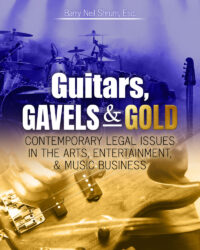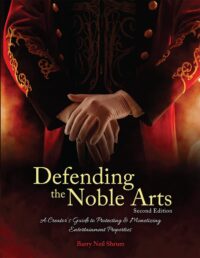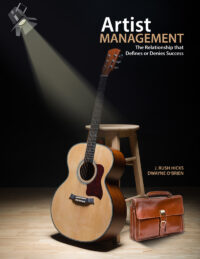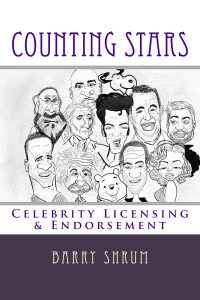Books
When it comes to making it big in the music industry, there is one bit of advice almost every insider will offer the up-and-coming would-be music star—get a good entertainment attorney. There is a very good reason this type of advice persists: there are few other areas of specialized legal practice that are more fluid, more wrought with peril, or more downright confusing than the entertainment industry broadly and more specifically, the music sector. Understanding current legal trends and cases is essential for the entertainment attorney, but the would-be star can also benefit from some of the principles that can be gleaned from the legal issues that arise in the music industry every day. The goal of Guitars, Gavels, & Gold is to shine a light on some current and past legal cases, both ongoing and decided, that directly impact the music and entertainment industries. Professor Shrum examines, for example, Justice Souter’s decision in Campbell v. Acuff-Rose that changed the direction of fair use analysis for decades to come, as well as the string of district court cases involving The Warhold Foundation v. Goldsmith, currently in front of the Supreme Court.
P.T. Barnum once said that “the noblest art is that of making people happy.”
Defending the Noble Arts is all about protecting what makes people happy. To that end, it draws the connection between the beliefs of two historic creators: Barnum and Thomas Jefferson’s declaration that the pursuit of happiness is an unalienable right. The title proposes that the creation of all forms of noble art historically deserve protection under this connection. Using the example of Walt Disney throughout as the exemplar of both a highly influential creator and a successive licensing conglomerate, the publication lays out a foundation of philosophical principles, legal rules and techniques to establish, protect and license the ideas that ultimately turn into entertainment properties, or the inalienable pursuit of happiness: songs, movies, books, characters and celebrity personas.
Artist Management: The Relationship That Defines or Denies Success brings the perspectives of both an artist’s personal manager and the artist to students. Of these roles—perhaps the two most divergent personality types—skillsets and perspectives must by necessity work the closest together to achieve success in the industry: the artist and the personal manager. Having those perspectives and personalities present in the same text both to lead and to learn from is rare and invaluable. Looking at the relationship is enlightening, even revelatory, and insights are worth passing along to anyone considering either role as a career.
Artist Management is the best, most time-tested advice that that the authors have to offer to those who are seriously considering entering the music business as a personal manager or to an artist looking for one. This isn’t primarily a “how-to” book or a to-do list of steps; it is intended to be more of a “who” and “what” resource: who does what in artist management and what does each promise to do for who? Artist Management is the culmination of a combined sixty+ years of personal experience in the music industry at the highest level.
The phenomenon of being a “star” or a “celebrity” is generally considered a fairly modern concept, created by the Golden Era of Hollywood, and perpetuated over the years by the growth of mass media, the Internet, social media and our “pop culture” driven society. The same activity that creates a person’s stardom affords that celebrity tremendous powers to exploit themselves and consequentially creates many opportunities for the celebrity to become exploited. For this reason, many celebrities become cynical, as if they are mere puppets being manipulated by their “handlers” who reinforce the old adage that “the show must go on.” It is, ultimately, a world where society not only count the stars, but count the dollars as well. In the legal world, we describe this power to exploit a celebrity the “right of publicity.” This book explores the psychological process behind society’s star gazing, ways to measure a celebrity’s influence, and methods of exploiting it through a legal process called licensing. In a very real sense, this is a book about “counting stars.”
Introduction by The Shark, Daymond John. Should society abolish all intellectual property? In the wake of such grassroots uprisings as the one generated by the SOPA legislation, there is a trend to answer that question in the affirmative, to discount the value of the copyright monopoly established long ago by our society. The movement extends worldwide, as organizations such as Sweden’s Pirate Bay Party and Missionary Church of Kopimism threaten to destroy the universal concept of monopolies for original thought. In the U.S., this historic concept was originated by James Madison and Thomas Jefferson when they drafted the Copyright Clause, Article 1, Section 8, Clause 8 of the Constitution, which gives authors and inventors an exclusive right to exploit the fruits of their labors for a limited time. In Origins of an Idea, Mr. Shrum defends the concept of original expression and the Constitutional protection for original ideas against this onslaught of attacks. Through reason and apologetics, from a philosophical and historical perspective, he defends and illustrates the value of the copyright concept and the inherent rights we have in our own original expressions.
Songwriter’s Market 2016: Where & How to Market Your Songs
Mr. Shrum is a featured contributor
THE MOST TRUSTED GUIDE TO SONGWRITING SUCCESS
For nearly 40 years, Songwriter’s Market has provided songwriters and performing artists with the most up-to-date information needed to place songs with music publishers, find record companies and producers, obtain representation with managers, and much more. Featuring a holistic focus on all aspects of songwriting–from idea generation to marketing–this completely updated edition has more resources than ever before, giving you the tools and first-hand knowledge you need to launch your songwriting career.

Taking Sides: Crime & Criminology, 10th Edition
Mr. Shrum is a featured contributor
Taking Sides edited by Thomas Hickey and Thomas Devaney, presents current controversial issues in a debate-style format designed to stimulate interest and develop critical thinking skills. Each issue is thoughtfully framed with an issue summary, an issue introduction, and a postscript or challenge questions. Mr. Shrum argues that downloading music illegally from the internet is morally wrong and should (See Issue 21 in the book).
Videos
Legal Guides
In the News
Muppets Illustrator Sues Over ‘Fozzie Krueger,’ Other Sculptures
Founding Attorney Barry Neil Shrum featured in Inside Music City podcast
Featured in Inside Music City
Sep 26, 2017
Mr. Barry Shrum, is a highly experienced entertainment lawyer who has been practicing law in the intellectual property, music, entertainment & business industries for over 25 years. He is also an experienced litigator, having practiced law in Philadelaphia as an both a litigator with a large Center City firm and as in-house counsel to a Fortune 50 company.
In Nashville, he has been lead counsel on major copyright infringement cases winning six-figure verdicts for my clients. He has negotiated and closed hundreds of deals exploiting and monetizing the rights of his clients and have helped protect countless individuals through the structuring and management of intellectual property rights.
Eric Clapton sued by bluesman's estate in dispute over iconic song
The lawsuit, filed in federal court in Nashville, alleges musician Eric Clapton attributed the song to the wrong songwriter, Huddie Ledbetter (better known as Lead Belly), in his 2013 re-release of his “Unplugged” album. It seeks more than $5 million from a slate of songwriters, publishers and broadcasters for receiving the royalties and failing to give Carter proper credit.
“This is a situation where you have the estate, the rightful owners of Bo’s intellectual property, just trying to get what’s rightfully theirs and get credit where credit is due,” said Barry Shrum, Floyd’s lawyer in Nashville. “Bo created this song and started, in essence, a genre in music and influenced many performers in the future, and he deserves that credit.”
Eric Clapton Sued by Bluesman's Estate Over Mistaken 'Unplugged' Credit
A lawsuit filed against Eric Clapton claims the guitarist mistakenly credited the wrong blues musicians in the liner notes of his 1992 Unplugged album.
However, in the lawsuit filed in Nashville, the estate of blues singer Armenter “Bo Carter” Chatmon argues that Clapton improperly credited Ledbetter for the track, and that the performance is actually a rendition of Chatmon’s “Corrine, Corrina.”






